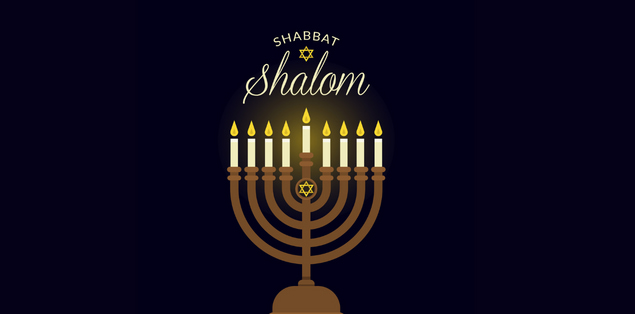So, what does Shabbat Shalom mean? The Hebrew term “Shevet,” which means “to stay,” is the root of the English word Shabbat, popularly known as the Sabbath, and also relates to the word Sheva which means number seven.
Peace, or “the absence of war,” is the most basic definition of shalom. Its setting and roots convey an inner wholeness and completion. However, there is a lot more to it than that. To delve into the origins of shalom, Keep reading this article.
The fourth of the Ten Commandments is Shabbat, one of the most significant Jewish rituals.
Jews exchange “Shabbat Shalom” greetings each week as the Jewish Sabbath approaches. In English, the term “shalom” can signify many different things, such as “hello,” “goodbye,” and, of course, “peace.” The Hebrew word for Saturday is Shabbat. Thus, the phrase “Shabbat Shalom” literally means “pleasant Shabbat.” Everyone is delighted when Shabbat, the day of rest, arrives, so sending someone a blessing at that time will make them very joyful.
Shabbat Falls on What Day?

Shabbat begins one hour before sunset on Friday night and lasts for a total of 25 hours, or until three stars shine at sunset on Saturday. When two Shabbat candles are lit with your eyes closed and Shabbat has officially begun, the home is filled with peace the instant you open your eyes and witness the two flames of holiness.
Scripture declares that Shabbat is a holy day of rest: According to Genesis 2:2–3, “And on the seventh day, God completed the work He had already begun, and He rested on the seventh day from all His previously completed work.” God, therefore, blessed and sanctified the seventh day since it was on it that He took a break from all of the things He had built and created.
Do Jews Say, Shabbat Shalom?

Anytime between Friday evening and Saturday afternoon, if you happen to be walking down the street in a Jewish community, you will see Jews of all denominations wishing one another a restful, pleasurable Shabbat. You can say goodbye and wish each other a lovely Shabbat as early as Wednesday.
Though what to say? As usual, different Jews have varied practices.
Ashkenazi Jews traditionally say “Gut Shabbos,” which translates to “Good Sabbath,” while greeting one another. In place of both “hello” and “goodbye,” this greeting is used. ” Ah, gutten Shabbos” is the slightly modified version that people use while parting. You’ll be in good company if you always say “Good Shabbos” rather than trying to recall the complexities of Yiddish.
What Is the Meaning of Shabbat Shalom?
So, what does Shabbat shalom mean? Shabbat Shalom, which means “may you dwell in peace and harmony on the seventh day,” begins to take shape when we combine these two words, and their definitions are superimposed.
In other words, We pray you to find true peace and are restored to wholeness when we take time to relax and respect the Lord. A magnificent interaction that renews and fortifies our souls occurs throughout Shabbat, which is an invitation to come and pray.
What Is the Correct Reply to Shabbat Shalom?

While “Shabbat shalom” is one way to wish people a peaceful weekend, there are several common sayings that convey the same sentiment. Shabbat Shalom is a Hebrew term as well. Some Yiddish expressions have equivalent, if not identical, meanings.
First off, Yiddish is a dialect of Hebrew, which saw widespread use in central and eastern Europe before the Holocaust. Today, many Yiddish speakers are Jewish and frequently reside in Israel, Russia, or the United States.
A frequent Yiddish expression with a definition akin to “Shabbat shalom” is “gut shabby.” It is a common phrase used to greet or bid farewell. It is similar to the common Hebrew expression “Shabbat shalom” in that it translates to “happy sabbath” in English.
The Hebrew word “Shavua Tov” is another phrase. On the Sabbath, individuals do not, however, use this one. Jews instead use it to greet one another a happy future week. After services on Saturdays, you’ll frequently hear individuals saying “Shavua Tov” to one another.
Jews frequently greet each other with “Shalom Aleichem” in both Yiddish and Hebrew. Unfortunately, this phrase isn’t just used on Saturdays, necessarily. It is more of a universal salutation that means “peace upon you.” You should respond by saying, “Aleichem shalom.” Like “Shabbat shalom,” this expression works well to convey a polite and friendly message any day of the week.
What Do You Do on Shabbat Shalom?

The majority of contemporary Jews observe Shabbat informally with a Friday night family supper. You bless the lights by candle-lighting along with melodious Shabbat songs, sip wine, utter another blessing, and then break challah—a special kind of Shabbat dinner—with your family. The traditional egg bread, known as challah, is twisted into two intertwined braids to represent the double share of manna that God gave the Jews after they left Egypt. After the synagogue service on Saturday afternoon, many Jews also observe the holiday with a family feast.
Even if you are not celebrating Shabbat for religious aspects, we think it’s a terrific idea to set aside one day each week for thought, thankfulness, and rest.
Final Words
The first chapter of Genesis describes how God made the earth and the sky in six days, including the creation of light and darkness, water and land, stars, trees, animals, and, of course, man. The Bible claims that after that, God ceased His activity, rested on the seventh day, and then blessed and created holy.
When God led the Children of Israel out of Egypt and into the wilderness, they received the first commandment requiring them to observe a Sabbath. Every day, God blessed and provided bread for the people, but on Shabbat, He didn’t. Instead, He offered twice as much manna on Friday. So instead of going out and gathering food, bringing it home, and cooking it, they were instructed to spend the Sabbath at home in their tents, relaxing and abstaining from all work. In this way, God would rest on the seventh day, and the people would say too.
God established Shabbat as a weekly holiday shortly after He issued the Ten Commandments so that all the Children of Israel may spend a day resting and acknowledging Him as the Creator of the universe.
